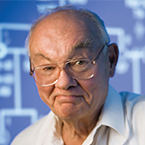
Henry T. Lynch, MD, FAACR, a pioneering geneticist whose work in identifying hereditary components of cancer led to groundbreaking advances against several cancer types, died June 2, 2019, at the age of 91.
Lynch was born in Lawrence, Massachusetts, on Jan. 4, 1928. He joined the U.S. Navy at age 16 and served in World War II. After the war, he earned a bachelor’s degree from the University of Oklahoma and a master’s degree in clinical psychology from the University of Denver. He studied genetics at the University of Texas at Austin and earned his medical degree from the University of Texas Medical Branch in Galveston.
After completing an internship at St. Mary’s Hospital in Evansville, Indiana, and a residency at the University of Nebraska College of Medicine, he served as an assistant professor at The University of Texas MD Anderson Cancer Center. In 1967, Lynch joined the faculty at Creighton University in Omaha, Nebraska. He later founded the university’s Hereditary Cancer Center and served as chairman of Creighton’s Department of Preventive Medicine and Public Health.
In his medical practice, Lynch noted that many cancer patients had relatives who had suffered the same type of cancer. He began research that established the main principles of cancer genetics: early age of disease onset, specific pattern of multiple primary cancers, and Mendelian patterns of inheritance in extended families. Lynch’s theories challenged conventional wisdom during the 1960s, when most researchers believed that cancer was caused by environmental factors.
Lynch’s work led to the identification of a strain of hereditary nonpolyposis colon cancer that is known today as Lynch syndrome in honor of his research. Later, Lynch discovered Mendelian patterns of inheritance in some breast and ovarian cancers, now known as hereditary breast/ovarian cancer syndrome. That work contributed to the discovery of the BRCA1 and BRCA2 mutations. His work earned him the nicknames “the father of cancer genetics” and “the father of hereditary cancer detection and prevention.”
Lynch received numerous awards during his career, including a Medal of Honor for Clinical Research from the American Cancer Society in 1997 and the AACR-Joseph H. Burchenal Memorial Award for Outstanding Achievement in Clinical Cancer Research in 2010. He was named a Fellow of the AACR Academy in 2016.
“Henry Lynch’s brilliant research transformed our understanding of the hereditary component of some common cancers, allowing for dramatic improvements in how we screen for these diseases,” said Margaret Foti, PhD, MD (hc), chief executive officer of the American Association for Cancer Research. “His contributions to the field of cancer genetics have improved the lives of countless patients.”
Career Highlights
2019 Inspiration Award, Kicks for a Cure
2019 Prevention/Genetics Award, OncLive Presents Giants of Cancer Care
2017 Luminary Award in GI Cancers, The Ruesch Center for the Cure of Gastrointestinal Cancers
2016 Honorary Fellowship, American College of Physicians
2014 Creighton University Research Award
2014 Gynecologic Oncology Innovation Award, Foundation for Women’s Cancers
2013 Seventeenth Annual Swatek Lectureship Loma Linda Pathology Group Award
2011 Creighton University’s 2011 Distinguished Faculty Service Award
2010 AACR-Joseph H. Burchenal Memorial Award for Outstanding Achievement in Clinical Cancer Research
2009 Impact Award, National Consortium of Breast Centers
2009 Outstanding Contribution to Cancer Research Award, Nebraska Oncology Society
2003 Jacqueline Seroussi Annual Award for Cancer Research, Jacqueline Seroussi Memorial Foundation, Tel Aviv University
2001 Lifetime Achievement Award in Inherited Pancreatic Diseases, International Association of Pancreatology
1998 Albion O. Bernstein, MD, Award, Medical Society of the State of New York
1998 Brinker Award for Scientific Distinction in Clinical Research, Susan G. Komen®
1997 AACR-American Cancer Society Award for Research Excellence in Cancer Epidemiology and Prevention
1997 Pezcoller Foundation-European School of Oncology Recognition for Contribution to Oncology
1997 Medal of Honor for Clinical Research, American Cancer Society
1987 Ungerman-Lubin Lecture Prize for Outstanding Cancer Research
1986 Distinguished Research Career Award, Creighton University
1960 MD, University of Texas Medical Branch, Galveston
[Institutional affiliations listed for Fellows reflect those held at the time of their induction into the AACR Academy.]